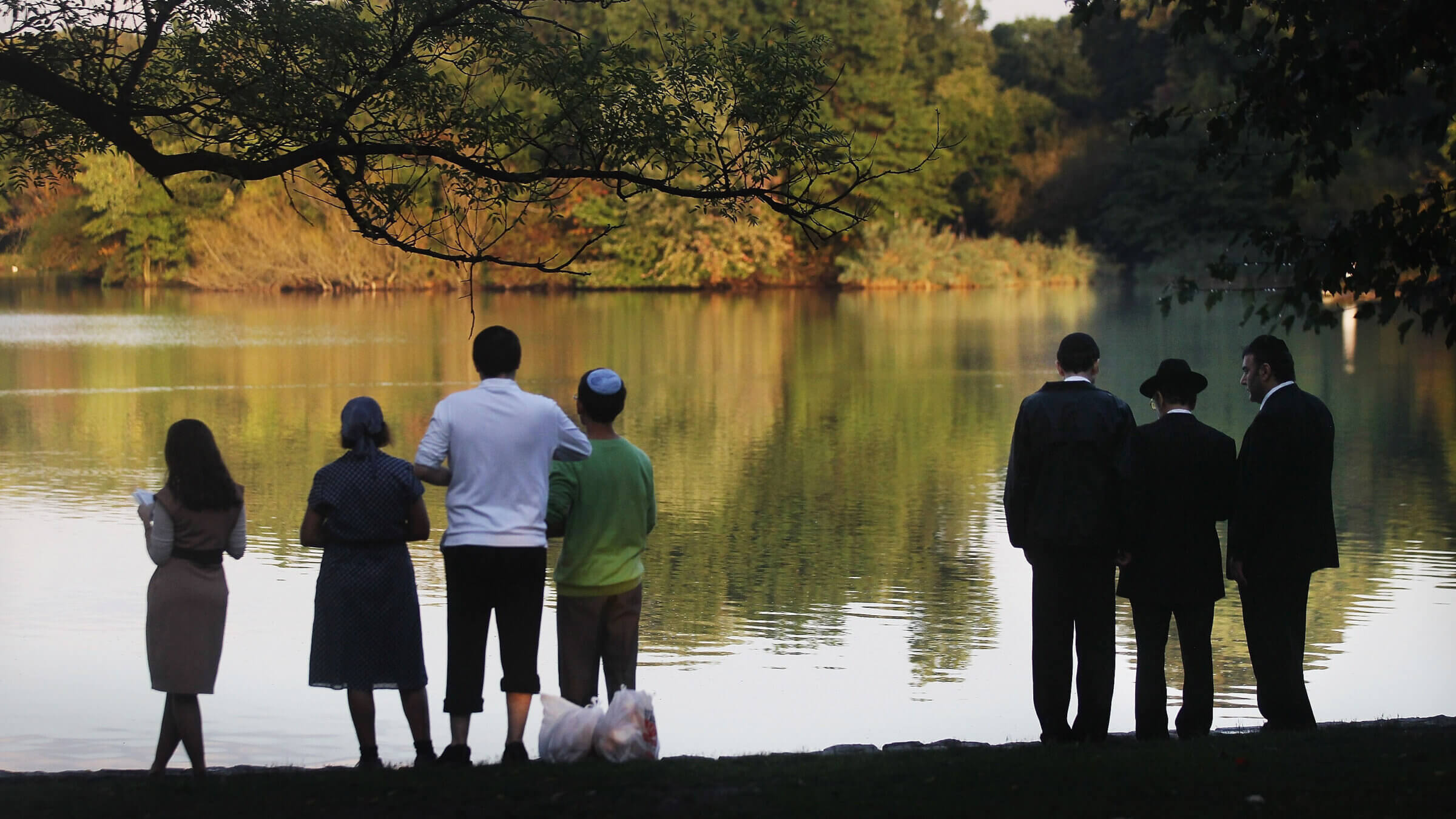Forgiveness has its limits: a Yom Kippur reflection on justice
What Jewish texts might say about this year’s sins and sinners

Jews mark the ceremony of tashlich, the casting of sins, in Prospect Park on September 29, 2011 in the Brooklyn borough of New York City Photo by Mario Tama/Getty Images
In the Jewish tradition, Yom Kippur is a day of reckoning – a time for reflection, repentance, and seeking forgiveness. But in 5785, the Day of Atonement comes after a year of so many bad actions by such genuinely horrible players that it seems right to consider whether some things actually just cannot be forgiven.
I’m a journalist, not a theological expert, but I can report that if you look for the answers in Judaism, you may find some contradictions. The forgiving interpretation might be that Judaism holds a complex view of atonement and forgiveness.
Our texts offer the suggestion that in an ideal world, we would all strive to forgive those who have wronged us. Proverbs 19:11 teaches (and yes, I had to look it up), “It is to one’s glory to overlook an offense.” This presents a rare combination of logic and beauty, releasing not only the miscreant from fear but the victim from the burden of anger and resentment, allowing both to move forward.
But it may also present a perverse incentive structure that encourages miscreants to act mischievously by never exacting a price.
Judaism also suggests that not every sin is forgivable. Throughout the Bible, one finds suggestions that some harms require harsh punishment. The prophet Isaiah issues a stark reminder: “Woe to those who enact evil statutes and to those who constantly record unjust decisions, so as to deprive the needy of justice and rob the poor of My people of their rights” (Isaiah 10:1-2).
The Latin principle of lex talionis – proportional justice – probably stems from ancient law codes, particularly the Babylonian Code of Hammurabi (around 1754 B.C.E.). But it is in the Bible that this concept finds its most famous manifestation, in Leviticus 24:19-20: “If anyone injures his neighbor, whatever he has done must be done to him: fracture for fracture, eye for eye, tooth for tooth.”
That sets both a principle of proportionality – and a certain kind of high bar. “An eye for an eye” suggests that when irreversible harm is done, forgiveness is not an obligation, indeed may not even be possible.
When wrongs leave permanent scars—whether physical, emotional, or societal — demanding forgiveness may place an undue burden on the victims. Should we expect a person whose family has been torn apart by violence to forgive without condition? Can a society whose members have been systematically oppressed and abused truly forgive without first achieving justice?
This certainly applies to much of what is playing out in various war zones all over the world right now. The wrinkle, of course, is that we cannot all agree on how to apportion the blame. Even Russia, which attacked Ukraine unprovoked in 2022, has defenders. This reaches a wild extreme in the case of Hezbollah, which has been sending rockets into Israel since the day after the Oct. 7 Hamas massacre – before Israel began bombarding and later invaded Gaza – yet has convinced people, including some journalists, that what it is doing somehow counts as “resistance.”
But in cases where the grievance is more than a narrative, Judaism has something of an answer, saying that forgiveness requires the aggressor to show sincere repentance. Maimonides, the great medieval Jewish philosopher, emphasized that repentance requires making amends to those we have harmed and seeking their forgiveness. You know that is not possible with the likes of Russian President Vladimir Putin or Hamas chief Yahya Sinwar. But we should remember that it happened in perhaps the most extremely unforgiveable scenario of all: The Jews, or at least the Jewish state, has forgiven Germany over the crimes of the Nazis, in which so many Germans were complicit.
The Germans convincingly repented. They have become arguably the most humane, ethical and tolerant of the global powers, and are among Israel’s most steadfast friends. It reaches comical extremes. Most of Israel’s other allies, including now even President Joe Biden, do not disguise their extremely well-deserved loathing of Prime Minister Benjamin Netanyahu. The German chancellors still try to disguise it.
We saw German repentance also in 2015, when Angela Merkel made the pivotal decision to allow more than 1 million refugees, mostly Muslims fleeing conflict, to enter her country. This policy, often referred to as Willkommenskultur (welcoming culture), was an incredible humanitarian gesture, as huge numbers of migrants were stranded in precarious conditions. Merkl suspended the Dublin Regulation, which required asylum seekers to register in the first European country they entered, inviting them to Germany directly.
(Politically, of course, Merkl was not forgiven, but punished. Her bold move led to the rise of the far-right party, Alternative für Deutschland (AfD), and her Christian Democrats were turfed from power.)
My sense, on this Yom Kippur, is that sometimes justice is more important than forgiveness. In a world where injustices are so horrifyingly common, this may be a time for accountability instead. Only then can we hope to repair the brokenness around us.
A message from our CEO & publisher Rachel Fishman Feddersen
I hope you appreciated this article. Before you go, I’d like to ask you to please support the Forward’s award-winning, nonprofit journalism during this critical time.
We’ve set a goal to raise $260,000 by December 31. That’s an ambitious goal, but one that will give us the resources we need to invest in the high quality news, opinion, analysis and cultural coverage that isn’t available anywhere else.
If you feel inspired to make an impact, now is the time to give something back. Join us as a member at your most generous level.
— Rachel Fishman Feddersen, Publisher and CEO